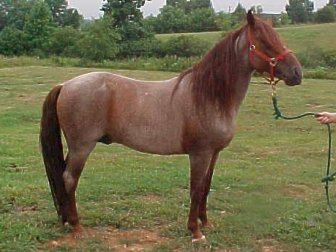
OVERVIEW
The Mountain Pleasure horse has been relatively unchanged for a century or more. It reflects the primitive Appalachian gaited horse type and may be ancestral to modern breeds developed in the region during the late 1800s and early 1900s, including the American Saddlebred and the Tennessee Walking Horse.
PHYSICAL DESCRIPTION
As a landrace, the Mountain Pleasure is variable in type, with some horses having distinctively Spanish features and others resembling the larger, modern breeds. Consistent among all is a smooth four-beat gait that replaces the trot. The horses stand 14.2-15.2 hands at the withers and weigh 850-950 pounds. Most of the solid colors known in horses occur in the breed, including grays and roans.
ORIGIN
The limestone plateau west of the Appalachian Mountains of the United States has long been known as horse country. Horse breeding has been an important economic enterprise, and horses have been used for riding, agricultural work, and pulling a variety of vehicles. They had to be easy keepers, rugged, sure-footed, and willing. Kentucky was also important because of its central location, where Spanish horses from the Southeast and Southwest could easily be crossed with English and European horses from the East.
History suggests that Spanish horses likely contributed the "gaited" characteristic found in many of the breeds developed in this region. Gaited horses are those which naturally have gaits other than (or in addition to) the walk, trot, and canter of all horses; they may include the rack, single foot, and running walk. These gaits are more comfortable for the rider than the trot.
INTERESTING FACTS
Mountain Pleasure horses are prized for their calm temperament, and the breed is best suited to be a family pleasure horse rather than a high powered show animal. The most famous Mountain Pleasure horse, however, was Roy Rogers' original Trigger. Since Trigger did not trot, he was always filmed at a walk or a canter.
INFLUENCES
1. Spanish
2. English
For more information:
Mountain Pleasure Horse Association
Listed as "Critical" by The American Livestock Breeds Conservancy (2004)